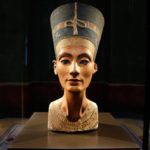 History
History  History
History  Weird Stuff
Weird Stuff 10 Wacky Conspiracy Theories You Will Need to Sit Down For
 Movies and TV
Movies and TV 10 Weird Ways That TV Shows Were Censored
 Our World
Our World 10 Places with Geological Features That Shouldn’t Exist
 Crime
Crime 10 Dark Details of the “Bodies in the Barrels” Murders
 Animals
Animals The Animal Kingdom’s 10 Greatest Dance Moves
 Movies and TV
Movies and TV 10 Box Office Bombs That We Should Have Predicted in 2025
 History
History 10 Extreme Laws That Tried to Engineer Society
 History
History 10 “Modern” Problems with Surprising Historical Analogs
 Health
Health 10 Everyday Activities That Secretly Alter Consciousness
 History
History 10 Dirty Government Secrets Revealed by Declassified Files
 Weird Stuff
Weird Stuff 10 Wacky Conspiracy Theories You Will Need to Sit Down For
 Movies and TV
Movies and TV 10 Weird Ways That TV Shows Were Censored
Who's Behind Listverse?

Jamie Frater
Head Editor
Jamie founded Listverse due to an insatiable desire to share fascinating, obscure, and bizarre facts. He has been a guest speaker on numerous national radio and television stations and is a five time published author.
More About Us Our World
Our World 10 Places with Geological Features That Shouldn’t Exist
 Crime
Crime 10 Dark Details of the “Bodies in the Barrels” Murders
 Animals
Animals The Animal Kingdom’s 10 Greatest Dance Moves
 Movies and TV
Movies and TV 10 Box Office Bombs That We Should Have Predicted in 2025
 History
History 10 Extreme Laws That Tried to Engineer Society
 History
History 10 “Modern” Problems with Surprising Historical Analogs
 Health
Health 10 Everyday Activities That Secretly Alter Consciousness
10 Reasons Antinatalists Think You Shouldn’t Have Been Born
Antinatalism is the philosophical view that it is almost never right for people to procreate. This stance seems absurd to many at first sight, but antinatalists have come up with arguments that they feel prove that being born is almost always a mistake. The writer Emil Cioran said, “Not to be born is undoubtedly the best plan of all. Unfortunately, it is within no one’s reach.”
The real world seems to be backing them up. Many countries are approaching, or have crossed, the point at which people are no longer giving birth to enough children to maintain the population. One of the factors in this may be that people are no longer confident that their children will have a better life than they did.
But since you have been born and are lucky enough to be reading Listverse, let’s explore why antinatalists think you should never have babies.
Related: Top 10 Worst Years To Be Alive in Human History
10 You Did Not Consent to Being Born

At some point, usually as a teenager and arguing with your parents, nearly everyone utters the immortal line, “I never asked to be born!” At first, this seems to just be a petulant whine used to argue against doing a chore. But for antinatalists, it is a genuine reason why having children is morally wrong.
The truth is that it is impossible for anyone to consent to being born. You literally do not exist until your parents create you. You cannot be consulted as to whether you agree to have a life. The topic of consent is a lively one in many moral debates as, generally, we think it is wrong to force someone to do anything against their will. And doing or being is essentially what parents are forcing their children to do when they give birth to them.
So next time something bad happens to you, just remember that you were forced into suffering it.[1]
9 Being Alive Entails Suffering

Many pessimist philosophers have come to the conclusion that existence means suffering. Even the best life that we can imagine for a person will involve some level of suffering. It seems to be impossible to live a human life without having some pain, whether it is physical or emotional. Even those who think they can help people often have a pessimistic view.
Sigmund Freud said about psychoanalysts who try to reduce the suffering of their patients that “the best we could hope for would be insights that left us feeling common, ordinary, everyday unhappiness.” Doctors know that by curing a patient one day, they are just making it possible for them to suffer another illness at a later date.
Being human means being aware of ourselves, so we not only experience pain as it happens, but we are also capable of looking ahead and seeing the many ways that we might suffer. Antinatalists would say that it is better never to have been born into a form that suffers so much.[2]
8 Bad Things Are Worse Than Good Things Are Pleasant

Perhaps the most famous antinatalist thinker at the moment is David Benatar. In his book Better Never to Have Been: The Harm of Coming into Existence, Benatar explains that there is a fundamental asymmetry between the good things in life and the bad.
Benatar argues that pain is bad, which most people agree with, and that pleasure is good. If a person is born, then they are capable of feeling pain (bad) and feeling pleasure (good). But let’s look at the case of a person who is never born. They are incapable of feeling any pain (which is good) but also incapable of feeling pleasure (which is neither bad nor good, as it is simply an absence).
According to Benatar’s calculation, this means that the better outcome is not to exist because there are no negatives to non-existence but real dangers to existing. Besides, pleasures tend to be fleeting, while pain can last for extended periods of time.[3]
7 Parents Gamble with Your Life

When parents decide to have a child, they are taking the ultimate gamble. They cannot know what their child’s life will be like, no matter how much they hope that it will be a good one. It might be so filled with suffering that the child finds life intolerable. The child may have terrible physical illnesses that leave them in a constant state of pain.
So imagine that you walk up to a person on the streets and flip a coin. One side of the coin will give them a happy life, while the other will fill the rest of their days with suffering. Most people would refuse to flip the coin and determine a person’s whole life in a risky gamble. For some antinatalists, this is not even a fair gamble because the pain side of the coin is more likely to come up. Yet parents take this wager all the time and often barely think about the possible outcomes of their actions in creating a life.[4]
6 We All Die in the End

David Benatar has a fairly grim view of human existence. “At all stages in human history, life has been filled with enough unpleasantness, enough badness, and of course always ending in death,” he says. It is hard to disagree with him. Since the beginning of time, there have been around 110 billion humans that have ever been born. So far, all but 8.1 billion have died. As such, being born inevitably leads to death.
Is death bad? For antinatalists, being dead is the same as no longer existing, and not existing is absent of pain. Being dead may not be bad, but the process of dying is almost always a horrible experience. Most people would be glad to die only once in the course of their lives. Dying can involve horrible pain from an accident, being felled by a drawn-out illness, or the slow and lingering removal of our faculties due to old age.[5]
5 Religions Suggest Non-Existence Is Better

We tend to think of religions as life-affirming and full of joy. However, many texts from world religions do not at all make it obvious that being born is a good thing.
The Book of Ecclesiastes (2:22-23) in the Bible does not paint a rosy view of human life. “For what profit shall a man have of all his labor, and vexation of spirit, with which he hath been tormented under the sun? All his days are full of sorrows and miseries, even in the night he doth not rest in mind: and is not this vanity?” In the Gospel of Luke (23:29), Jesus on the cross tells the lamenting women around him, “For behold, the days shall come, wherein they will say: Blessed are the barren, and the wombs that have not borne, and the paps that have not given suck.”
Perhaps Buddha has the best claim toward antinatalism among religious figures. The first of the Four Noble Truths of Buddhism is that existence is suffering. In one Buddhist sutra, the Buddha is asked about how humans come into being. The Buddha responds by saying, “I do not extol the production of a new existence even a little bit; nor do I extol the production of a new existence for even a moment. Why? The production of a new existence is suffering. For example, even a little [bit of] vomit stinks. In the same way, the production of a new existence, even a little bit, even for a moment, is suffering.”[6]
4 Suicide Is Painful

For antinatalists, being born is a mistake, so surely ending your existence as soon as possible would be the best thing to do? For most philosophers who believe in antinatalism, suicide is not the answer, however.
David Benatar, in an article written to refute his critics titled “Still Better Never to Have Been,” has an answer. “First, it is possible to think both that coming into existence is a serious harm and that death is (usually) a serious harm. Indeed, some people might think that coming into existence is a serious harm in part because the harm of death is then inevitable.”
Suicide is harmful to both the person who dies and causes suffering to those left behind. So, once you are born, there is no easy way out of the condition you have been thrust into.[7]
3 Existing Is Worse Than Not Existing

There have always been philosophers and thinkers who have thought there was something deeply wrong with being alive. The ancient Greek writer Sophocles waxed poetical on the matter.
“Not to be born is, beyond all estimation, best; but when a man has seen the light of day, this is next best by far, that with utmost speed he should go back from where he came. For when he has seen youth go by, with its easy merry-making, what hard affliction is foreign to him, what suffering does he not know? Envy, factions, strife, battles, and murders. Last of all falls to his lot old age, blamed, weak, unsociable, friendless, wherein dwells every misery among miseries.”
Epicurus also thought that not existing was not harmful to humans. “Death is nothing to us. When we exist, death is not; and when death exists, we are not. All sensation and consciousness ends with death, and therefore, in death, there is neither pleasure nor pain.”[8]
2 Humans Are Pretty Terrible for the World

Almost everyone admits that human civilization has done terrible things for the environment. Humans have hunted species to extinction. Humans have destroyed the habitats of countless organisms. Humans have little compulsion about wrecking the planet so long as there is a little profit in the bargain. The climate crisis caused by human activity means that species that have not already been harmed by humanity may be soon, wherever they are.
In his book Inner Experience, the French intellectual Georges Bataille wrote, “Nature giving birth to man was a dying mother: she gave being to the one whose coming into the world was her own death sentence.” This is essentially what ecological antinatalists believe. Better not to bring more humans into the world when they will only harm the world.[9]
1 Humans Are Pretty Terrible to Each Other
Some of the arguments put forward by antinatalist philosophers paint a very unflattering picture of humanity. These are the misanthropic arguments, and they point out that humans do terrible things to other humans.
Benatar looked at humans with a dispassionate eye when he came up with these arguments. “Another route to anti-natalism is via what I call a ‘misanthropic’ argument. According to this argument, humans are a deeply flawed and a destructive species that is responsible for the suffering and deaths of billions of other humans and non-human animals. If that level of destruction were caused by another species, we would rapidly recommend that new members of that species not be brought into existence.”
What is human history but an account of wars, dictators, repressions, genocides, and slavery? I’m certain most people can think of a world leader or two who would have made the world better if they had never been born. But it is not necessary to think on such a grand scale. In our own lives, most of the bad things that happen to us come about because of the actions of other humans. If this is true, then the moral calculus becomes simple: if a person is not born, they cannot cause harm to anyone else.[10]







